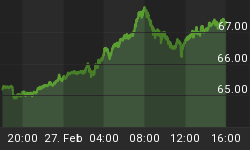The Fed chairman's first press conference generated neither heat nor light, but did include some typically, um, questionable statements. Here are a few, followed by responses in bold:
"Keeping inflation low and boosting the economy are good for the dollar over the medium-term."
Well, duh. But talking about controlling inflation while interest rates are at record low levels and commodities are soaring is pointless. Eventually energy and food prices will work their way through to restaurant menus and store shelves (see McDonalds and Huggies) and then inflation won't be low -- even by the government's deceptive accounting. That won't be good for the dollar.
"There's not much the Fed can do about gas prices per se. After all the Fed can't create more oil. We don't control emerging markets. What we can do is try to keep higher gas prices from passing into other prices, creating a broader inflation. Our view is that gas prices will not continue to rise at the recent pace."
The Fed might not control emerging markets but it does affect them. We're exporting our inflation to them by supporting US consumer borrowing and keeping interest rates low, which creates a torrent of hot money flowing into Brazil, China and India. That's why they're overheating.
Put another way, they're paying the price for our lack of self-control. China is raising rates and Brazil is at 12% already, which means they're looking at a combination of slower growth and continued high prices. This is a huge problem for countries where many workers spend most of their paychecks on food and energy.
"The inflationary expectations we're concerned about are long-term. Our anticipation is that oil prices will stabilize or come down. If firms aren't passing on higher costs into broader prices, broader inflation, then we'll feel more comfortable watching and waiting to see how it evolves... Long-term expectations are still stable. We're confident they'll stay down."
Letting inflation run and hoping it doesn't persist is extraordinarily dangerous, because by the time people figure out that it is going to persist you won't be able to quickly change their minds. They'll be dumping their bonds and buying real assets like gold and silver and farmland, sending the dollar down and interest rates up. Then you'll have to spend years convincing them that they're wrong by raising short-term rates and engineering a recession. And that's the optimistic scenario. A recession with home prices already falling and systemic debt at record levels would risk a return to the mid-1930s, when a brief recovery turned into the Great Depression.
"We're completing purchases by July. It probably won't have significant impact on markets or the economy because the market already knows that. It's not the pace of ongoing purchase that matters, but the size of the portfolio we hold. We'll continue to reinvest, so our portfolio size will remain constant. Any changes to portfolio size would depend on pace of economic recovery."
What he's saying is that the Fed will continue to buy up Treasuries and other kinds of debt with the proceeds of its maturing bonds. This is a massive amount of money, hundreds of billions a year, so in effect QE 2 won't really end.
"All I can say is, recovery is moderate, but I do think the pace will pick up over time. Over the long run, the US will return to being the most productive and dynamic economy in the world. It hasn't lost any of its basic characteristics."
Unfortunately the US has lost one of its most basic characteristics: a solid balance sheet. We're effectively bankrupt, and the resulting loss of flexibility and access to capital will fundamentally change this country in the future. A few pockets of innovation won't be able to bail out an insolvent majority.
"We're using new tools, but nothing we're doing is fundamentally different from what we normally do. We're monitoring inflation as well as recovery. The problem is the same one central banks always face -- which is tightening at the right time of a recovery. But we have a lot of experience with how to do this, and we'll tighten as conditions warrant."
Let's consider that experience...the junk bond bubble of the 1980s, the tech bubble of the 1990s, the housing bubble, and now this, whatever it is. Not reassuring.















